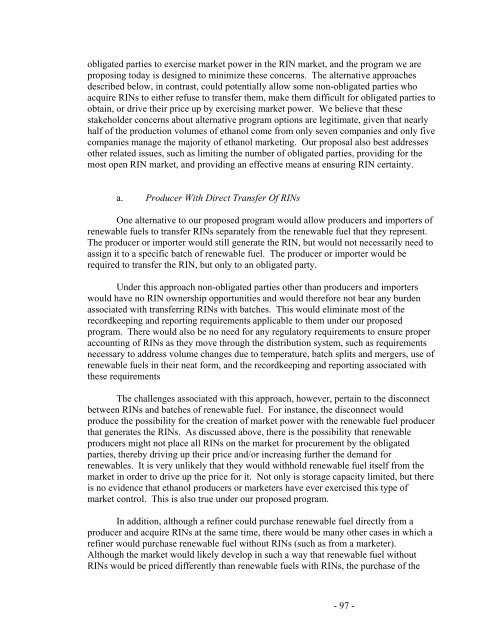Regulation of Fuels and Fuel Additives: Renewable Fuel Standard ...
Regulation of Fuels and Fuel Additives: Renewable Fuel Standard ...
Regulation of Fuels and Fuel Additives: Renewable Fuel Standard ...
Create successful ePaper yourself
Turn your PDF publications into a flip-book with our unique Google optimized e-Paper software.
obligated parties to exercise market power in the RIN market, <strong>and</strong> the program we are<br />
proposing today is designed to minimize these concerns. The alternative approaches<br />
described below, in contrast, could potentially allow some non-obligated parties who<br />
acquire RINs to either refuse to transfer them, make them difficult for obligated parties to<br />
obtain, or drive their price up by exercising market power. We believe that these<br />
stakeholder concerns about alternative program options are legitimate, given that nearly<br />
half <strong>of</strong> the production volumes <strong>of</strong> ethanol come from only seven companies <strong>and</strong> only five<br />
companies manage the majority <strong>of</strong> ethanol marketing. Our proposal also best addresses<br />
other related issues, such as limiting the number <strong>of</strong> obligated parties, providing for the<br />
most open RIN market, <strong>and</strong> providing an effective means at ensuring RIN certainty.<br />
a. Producer With Direct Transfer Of RINs<br />
One alternative to our proposed program would allow producers <strong>and</strong> importers <strong>of</strong><br />
renewable fuels to transfer RINs separately from the renewable fuel that they represent.<br />
The producer or importer would still generate the RIN, but would not necessarily need to<br />
assign it to a specific batch <strong>of</strong> renewable fuel. The producer or importer would be<br />
required to transfer the RIN, but only to an obligated party.<br />
Under this approach non-obligated parties other than producers <strong>and</strong> importers<br />
would have no RIN ownership opportunities <strong>and</strong> would therefore not bear any burden<br />
associated with transferring RINs with batches. This would eliminate most <strong>of</strong> the<br />
recordkeeping <strong>and</strong> reporting requirements applicable to them under our proposed<br />
program. There would also be no need for any regulatory requirements to ensure proper<br />
accounting <strong>of</strong> RINs as they move through the distribution system, such as requirements<br />
necessary to address volume changes due to temperature, batch splits <strong>and</strong> mergers, use <strong>of</strong><br />
renewable fuels in their neat form, <strong>and</strong> the recordkeeping <strong>and</strong> reporting associated with<br />
these requirements<br />
The challenges associated with this approach, however, pertain to the disconnect<br />
between RINs <strong>and</strong> batches <strong>of</strong> renewable fuel. For instance, the disconnect would<br />
produce the possibility for the creation <strong>of</strong> market power with the renewable fuel producer<br />
that generates the RINs. As discussed above, there is the possibility that renewable<br />
producers might not place all RINs on the market for procurement by the obligated<br />
parties, thereby driving up their price <strong>and</strong>/or increasing further the dem<strong>and</strong> for<br />
renewables. It is very unlikely that they would withhold renewable fuel itself from the<br />
market in order to drive up the price for it. Not only is storage capacity limited, but there<br />
is no evidence that ethanol producers or marketers have ever exercised this type <strong>of</strong><br />
market control. This is also true under our proposed program.<br />
In addition, although a refiner could purchase renewable fuel directly from a<br />
producer <strong>and</strong> acquire RINs at the same time, there would be many other cases in which a<br />
refiner would purchase renewable fuel without RINs (such as from a marketer).<br />
Although the market would likely develop in such a way that renewable fuel without<br />
RINs would be priced differently than renewable fuels with RINs, the purchase <strong>of</strong> the<br />
- 97 -
















